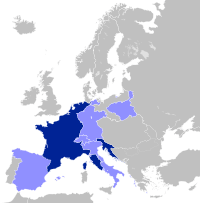Salm-Reifferscheid-Dyck
"Salm-Dyck" redirects here. For the botanist, see Joseph zu Salm-Reifferscheidt-Dyck.
| County of Salm-Reifferscheid-Dyck | ||||||||||
| Grafschaft Salm-Reifferscheid-Dyck | ||||||||||
| State of the Holy Roman Empire, then Client of the First French Empire and State of the Confederation of the Rhine | ||||||||||
| ||||||||||
| Capital | Dyck | |||||||||
| Government | Principality | |||||||||
| Historical era | Napoleonic Wars | |||||||||
| • | Partitioned from Salm-Reifferscheid | 1639 1639 | ||||||||
| • | Joined the Rhine confederation | 1806 | ||||||||
| • | Annexed by France | 1811 | ||||||||
| • | Mediatised to Prussia | 1813 | ||||||||
| ||||||||||
Salm-Reifferscheid-Dyck was a small County of the Holy Roman Empire. Its territory was the area around Dyck (south-east of Mönchengladbach) in present North Rhine-Westphalia, Germany. Salm-Reifferscheid-Dyck was a partition of Salm-Reifferscheid, and was annexed by the First French Empire in the French Revolutionary Wars, in 1811.
The county was mediatised to Kingdom of Prussia in 1813, of which Salm-Reifferscheid-Dyck became a princely title three years later. When the committal line died out, in 1888, the style was assumed by the princes of Salm-Reifferscheid-Krautheim.
The full princely style was "Imperial Prince of Salm, Duke of Hoogstraten, Forest Count of Dhaun and Kyrburg, Rhine Count of Stein, Lord of Diemeringen and Anholt".
Counts and Princes of Salm-Reifferscheidt-Dyck (1639–1888)
- Ernest Salentin, Count 1639-1684 (1621–1684), second son of Ernst Friedrich, Count of Salm-Reifferscheidt
- Francis Ernest, Count 1684-1727 (1659-1727)
- Augustus Eugene Bernard, Count 1727-1767 (1706–1767)
- Johann Franz Wilhelm, Count 1767-1775 (1714–1775)
- Joseph Franz, Count 1775-1806, 1st Prince 1816-1861 (1773–1861)
- Prince Franz Joseph August of Salm-Reifferscheidt-Dyck (1775-1826)
- Alfred Joseph Klemens, Count and 2nd Prince 1861-1888 (1811-1888)
- Francis Ernest, Count 1684-1727 (1659-1727)
This article is issued from Wikipedia - version of the 2/9/2016. The text is available under the Creative Commons Attribution/Share Alike but additional terms may apply for the media files.
